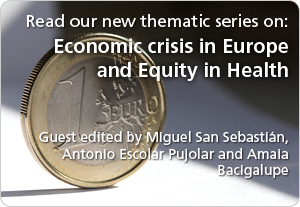
An unprecedented economic crisis is affecting Europe, focusing mainly on the southern countries. Improving health and reducing health inequalities in this macro-economic environment is going to be a great challenge, which the new thematic series in International Journal for Equity in Health discusses. In this guest blog, Dr Miguel San Sebastián, one of the series editors, looks at what the first papers can tell us about the challenges faced.
The economic and social crisis that the European population has experienced since 2008 has fuelled interest in the study of its potential health impacts.
With regard to public health, and particularly social epidemiology, the need to deal with the problem of the economic crisis encourages natural experiments. From these it is possible to visualize the relationships between social determinants and health, and to assess the usefulness of the health policies and interventions required to buffer the negative impact of the crisis.
The International Journal of Equity for Health has launched a series – Economic Crisis in Europe and Equity in Health. It will run until December 2018 and is introduced by a special collection of papers that reflect some of the research currently being done.
In this first cluster of papers, we will travel from the north to the south of Europe, with a stopover in Greece. During the journey, diverse methodological approaches and different health outcomes have been used to examine the health impacts of the economic crisis.
The first, a commentary by de Vogli, gives us a broad perspective on the origins of the economic crisis, summarizes some of its terrible health consequences and points out the need for a new global political strategy that abandons the current neoliberal policies and creates an economy that serves humankind.
In the north, Blomqvist et al. observe an increase in women’s mental distress in four labor market groups in the county of Stockholm, while Ásgeirsdóttir et al. show an increase in health-income inequality that favors the better off in Iceland.
A comparison of pharmaceutical sector policies implemented in Finland and Portugal to contain country spending during the economic recession is analyzed by Leopold et al.
In southern Spain, a rapid increase in suicide attempt rates and the association of unemployment with growing suicidal behavior in men is described by Córdoba-Doña et al., and Kyriopoulos et al. present current inequalities in access to health care services for chronic patients in Greece. Finally, Bacigalupe and Escolar close the cluster with a review about how much is known in the literature about the impact of economic crises on social inequalities in health.
We look forward to gathering more knowledge about the impact of the European economic crisis on equity in health and are pleased to invite you to submit a manuscript to this series!

Guest edited by: Dr Miguel San Sebastián, Dr Antonio Escolar Pujolar and Dr Amaia Bacigalupe.
Comments